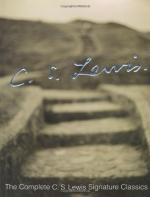|
This section contains 6,290 words (approx. 21 pages at 300 words per page) |

|
SOURCE: "The Everyday C. S. Lewis," in First Things, No. 85, August-September, 1998, pp. 27-33.
In the following essay, Meilaender examines Lewis's ability to illustrate the spiritual significance of commonplace experience. For Lewis, Meilaender notes, "the whole of life … every ordinary and everyday moment of it, every choice that we make, is charged with the significance of an eternal either/or."
"One is sometimes (not often) glad not to be a great theologian. One might so easily confuse it with being a good Christian." Thus C. S. Lewis wrote in Reflections on the Psalms. Similarly, Lewis' religious writings are full of asides to the effect that he is not a theologian and that what he says is subject to correction by real theologians. In part, of course, let us recognize this for what it is: a smart rhetorical strategy that gets the reader on his side over against the presumably...
|
This section contains 6,290 words (approx. 21 pages at 300 words per page) |

|


